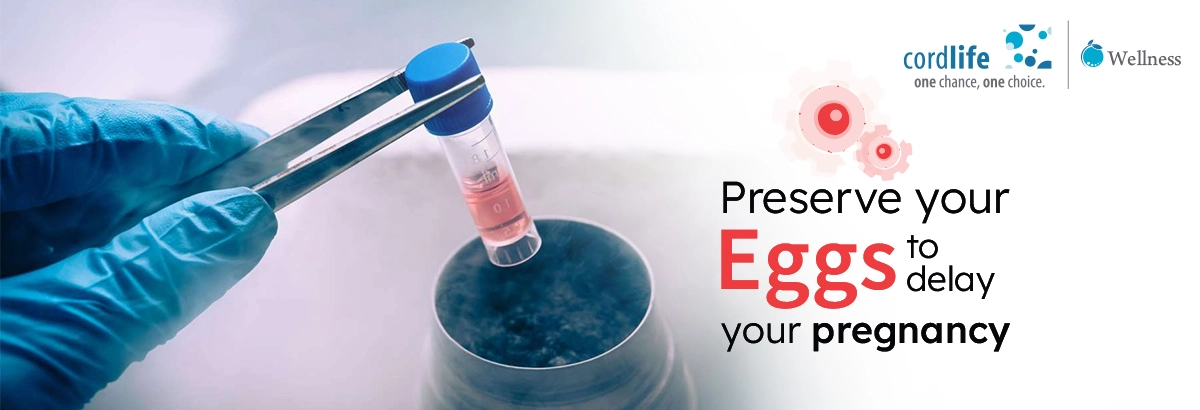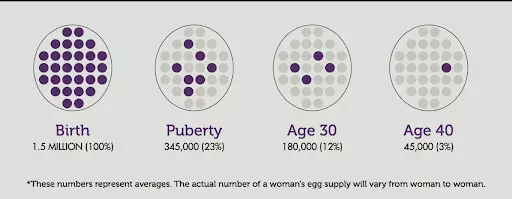Table of Contents
Egg freezing is also known as oocyte cryopreservation. This has gained popularity in the last 5 years. Healthcare professionals involve hormonal stimulation of the ovaries, in this process and follow it with retrieval and storage of viable eggs. This technique improves the chances of pregnancy even if the pregnancy is delayed. Once you are prepared to become a mother, the eggs are fertilised with the help of a donor’s sperm and they get implanted in the uterus through the process called in vitro fertilisation (IVF). The American Society of Reproductive Medicines no longer considers this process to be experimental.
What is the Best Time to Freeze Your Eggs?
A woman is born with a fixed number of eggs in her ovaries. The peak reproductive age of a woman is between the late teens and the late 20s. That said, the younger you are, the better your chances of becoming a mother. Research has also shown the best time to freeze your eggs is between 25 and 30 years of age.
However, many of you prefer to wait to plan a baby. Due to personal, professional, or financial or you may prefer to plan your baby after you are 30 or 35 of age. There are biological factors. A woman’s ovaries release one egg a month. After 30 or 35 years old, both the quality and quantity of eggs start declining and there is very little chance of quality egg retrieval, the eggs will have more chromosomal abnormalities, and the ovaries will stop releasing the eggs. Also, conditions like Fibroids and Polycystic Ovarian Cysts are responsible for age-related ovarian changes and can result in the decline of the health of the eggs, thus making your pregnancy difficult after 30.
What Should You Consider Before you Begin the Egg-freezing Process?
Before you go for the egg-freezing procedure, the doctor you visit will take you through a few examinations. These examinations include:
Family Medical History
Your doctor will check the medical history of your family. That is because, if the women in the family had ovarian insufficiency (premature ovarian failure – when the ovaries stop working before 40 years old) or have suffered early menopause, there is a chance of your suffering from the same.
Anti-mullerian Hormone (AMH) Test
Your doctor will take you through an anti-mullerian hormone (AMH) test. This is a marker of an ovarian reserve. What is an ovarian reserve?
The ovarian reserve refers to “the reproductive potential left within a woman’s two ovaries based on the number and quality of eggs.” (Lower count or quality of the number of eggs is responsible for reduced or decreased egg reserve). Going deeper, this test will show how many eggs you have, will also determine the quality of the eggs, and will further let both you and your doctor understand how well are you going to respond to the hormone injection therapy. Moreover, this test will ensure the functioning of the ovaries.
What is the Egg-freezing Procedure?
Once you get the medical scan reports, you would have to consult your healthcare provider yet again to begin the egg–freezing process. The process includes:
Hormonal and Ovarian Stimulation
To obtain eggs for freezing, you might have to undergo hormonal stimulation for around 10 to 12 days6. Your healthcare provider will give you two injections – follicle-stimulating hormone (FSH) and luteinizing hormone (LH). These hormonal injections will help the eggs to mature. Other than these injections, you will also get shots of gonadotropin-releasing hormone (GnRH) and human chorionic gonadotropin (hCG) injections to stop and start the process of ovulation.
Ultrasound Scans
To know how many follicles (the egg sacs) are there and to determine hormone levels, you might have to undergo various ultrasound scans before egg freezing.
Egg Retrieval
This is the collection process of fully mature eggs. The healthcare practitioner inserts the ultrasound-guided needle into the vaginal wall to retrieve the eggs from the ovary. After the collection of the eggs, they are sent to the labs for vitrification and egg storage.
Egg Vitrification and Freezing
That means each egg is put in liquid nitrogen and stored at -1960C. This is a cryoprotectant process. This is going to take approximately 2 to 3 weeks. The time may vary from one woman to another.
Need More Information About Cordlife Stem Cell Banking?
Book a FREE Presentation Now
The cost of egg freezing may be a little on the higher side, but egg freezing followed by in vitro fertilisation as well as embryo transfer benefits you to become a mother even at an advanced age. After stepping into the pregnancy journey by using the thawed eggs, you can make an informed decision about cord blood banking and its benefits and go for it not just for the health of your child, but also for your family’s healthy future.

